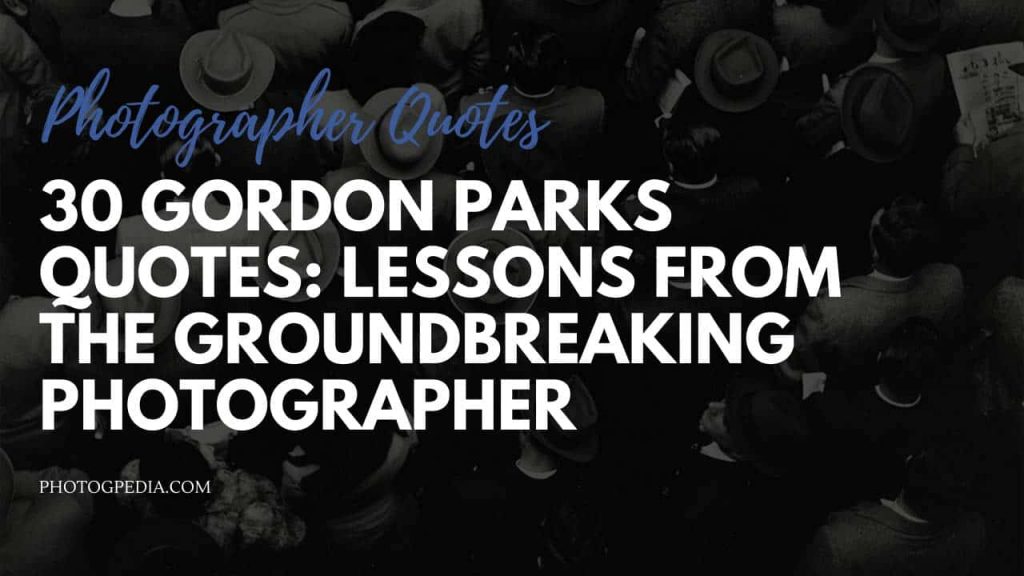The American Gordon Parks was a pioneering photographer, who is best known for his images of African-American social history and the civil rights movement of the 1950s and 1960s.
Parks was a man committed to social equality, and he saw photography as a weapon to move people to action and change lives. He became the first black photographer on staff at Life magazine in the late 1940s and continued to work for the magazine for over 20 years.
Although Parks’ greatest achievements as a photographer were his enduring documentary photographs, he also cultivated a reputation as a fashion photographer in the 50s and 60s.
Parks was often referred to as a renaissance man. In addition to his photography work, he was also a groundbreaking filmmaker, writer and composer.
He was the first black director to make a major Hollywood studio film, with the release of The Learning Tree in 1969. In 1971, Park directed his landmark film, Shaft, an action-packed thriller that gave America its first black hero. The film is credited as one of the first blaxploitation films.
In this article, we have listed 30 Gordon Parks quotes to inspire, motivate and help take your photography to the next level. Hopefully, these words of wisdom from one of the all-time great photographers will encourage you to take a closer look at his incredible work.
Gordon Parks Quotes
The funny and sad thing is that photography is an art, but these guys have such an inferiority complex about it that all they do is tag on gold-plate words where they aren’t needed. If they’d only let it talk for itself.
Pictures I’ve made that have become the most important pictures, were pictures that I wished I never had to take – of people who were impoverished, people in need – and I suppose that I pointed my camera mostly at people who needed someone to say something for them. They couldn’t speak for themselves.
At first I wasn’t sure that I had the talent, but I did know I had a fear of failure, and that fear compelled me to fight off anything that might abet it.
Those people who want to use a camera should have something in mind, there’s something they want to show, something they want to say.
If you don’t have anything to say, your photographs are not going to say much.
The guy who takes a chance, who walks the line between the known and unknown, who is unafraid of failure, will succeed.
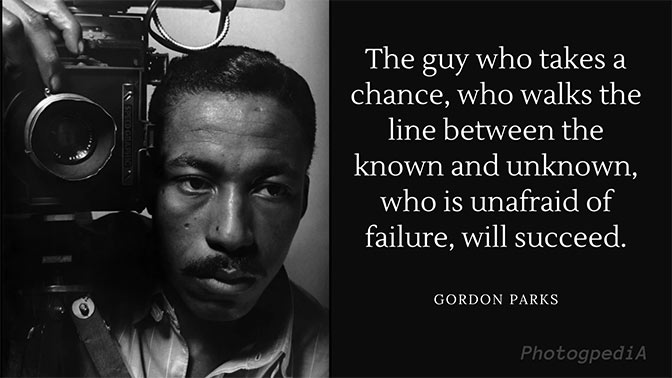
Documentary Photography Quotes
People in millenniums ahead will know what we were like in the 1930’s and the thing that, the important major things that shaped our history at that time. This is as important for historic reasons as any other.
Think in terms of images and words. They can be mighty powerful when they are fitted together properly.
I must attempt to transcend the limitations of my own experience by sharing, as deeply as possible, the problems of those I photograph.
I was born to a black childhood of confusion and poverty. The memory of that beginning influences my work today, It is impossible now to photograph a hungry child without remembering the hunger of my old childhood.
I suffered first as a child from discrimination, poverty… So I think it was a natural follow from that that I should use my camera to speak for people who are unable to speak for themselves.
I don’t know that I was any better equipped. I probably… in some instances I was, more than probably the white photographers because of an emotional something that probably I was closer to or akin to which has certainly been in my favour since. Some of those Negro stories that I’ve done for Life and Standard Oil and other places have dealt with poverty, dealt with the emotional aspect of everyday living, because my own life was packed, early life, was packed with so much of it.
I have for a long time, worked under the premise that everyone is worth something; that every life is valuable to our own existence. Consequently, I’ve felt it was my camera’s responsibility to shed light on any condition that hinders growth or warps the spirit of those trapped in the ruinous evils of poverty… To me they were ghosts of my own past.
I want my children and children’s children to be able to look at my pictures and know what my world was like. Even if it only helps a little bit toward this understanding, then I’ve done my job and done it well.
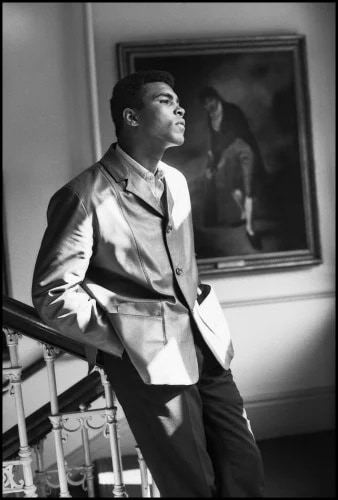
Parks on Subjects
The subject matter is so much more important than the photographer.
The photographer begins to feel big and bloated and so big he can’t walk through one of these doors because he gets a good byline; he gets notices all over the world and so forth; but they’re really… the important people are the people he photographs. They are what make him.
I’d become sort of involved in things that were happening to people. No matter what colour they be, whether they be Indians, or Negroes, the poor white person or anyone who was I thought more or less getting a bad shake. I thought I had the instinct toward championing the cause.
You know, the camera is not meant just to show misery. You can show beauty with it; you can do a lot of things. You can show – with a camera you can show things that you like about the universe, things you hate about the universe. It’s capable of doing both. And I think that after nearly 85 years upon this planet that I have a right after working so hard at showing the desolation and the poverty, to show something beautiful as well. It’s all there, and you’ve only done half the job if you don’t do that.
I feel it is the heart, not the eye, that should determine the content of the photograph. What the eye sees is its own. What the heart can perceive is a very different matter.
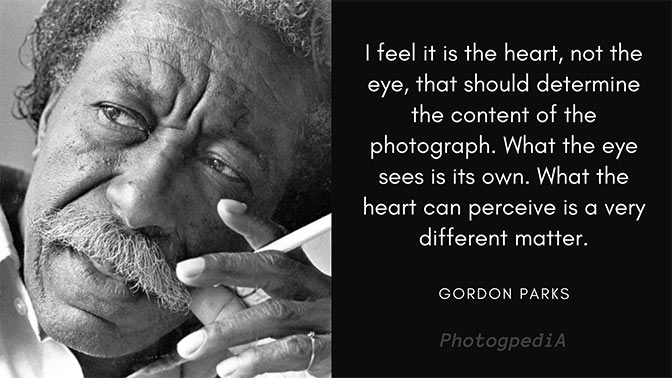
Higher Purpose and Change
The world must see the tragedy of poverty as it is, and feel all its drama. Everyone must face the problems of humanity. My way of facing these issues is through photography. It is important because it can show, without needing words, everything that is wrong and can be improved.
I had known poverty firsthand, but there I learned how to fight its evil – along with the evil of racism – with a camera.
I’ve known both misery and happiness, lived in so many different skins it is impossible for one skin to claim me. And I have felt like a wayfarer on an alien planet at times – walking, running, wondering about what brought me to this particular place, and why. But once I was here the dreams started moving in, and I went about devouring them as they devoured me.
I thought then [1941], and Roy Stryker eventually proved it to me, that you could not photograph a person who turns you away from the motion picture window, or someone who refuses to feed you, or someone who refuses to wait on you in a store. You could not photograph him and say “This is a bigot,” because bigots have a way of looking like everybody else.
I’ve been asked if I think there will ever come a time when all people come together. I would like to think there will. All we can do is hope and dream and work toward that end. And that’s what I’ve tried to do all my life.
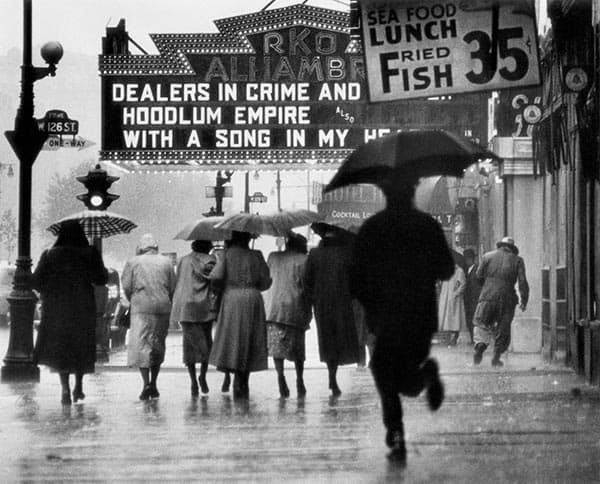
The Camera as a Weapon for Fighting Evil
What the camera had to do was expose the evils of racism, the evils of poverty, the discrimination and he bigotry, by showing the people who suffered most under it. That was the way it had to be done.
I suffered evils, but without allowing them to rob me of the freedom to expand.
I have always felt as though I needed a weapon against evil.
You have a 45mm automatic pistol on your lap, and I have a 35mm camera on my lap, and my weapon is just as powerful as yours.
Gordon Parks to Black Panther militant Eldridge Cleaver
I picked up a camera because it was my choice of weapons against what I hated most about the universe: racism, intolerance, poverty. I could have just as easily picked up a knife or a gun, like many of my childhood friends did … most of whom were murdered or put in prison… but I chose not to go that way. I felt that I could somehow subdue these evils by doing something beautiful that people recognise me by, and thus make a whole different life for myself, which has proved to be so
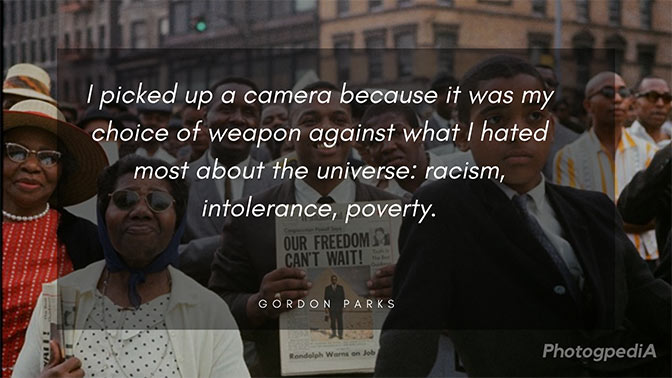
What’s your Favorite Gordon Parks Quote?
Have a favorite Gordon Parks quote from the list? Let us know in the comment section below.
Don’t forget to bookmark this page, or print it out, and refer to it next time you need some inspiration. If you’ve found the article helpful, then we would be grateful if you could share it with other photographers.
To learn more about Parks’ life and photography work, check out the Gordon Parks Foundation website.
Looking for more words of wisdom from master photographers? Check out the quotes section of Photogpedia for more great photography quotes.
Related Quote Articles:

